but的用法
- 格式:doc
- 大小:57.00 KB
- 文档页数:21
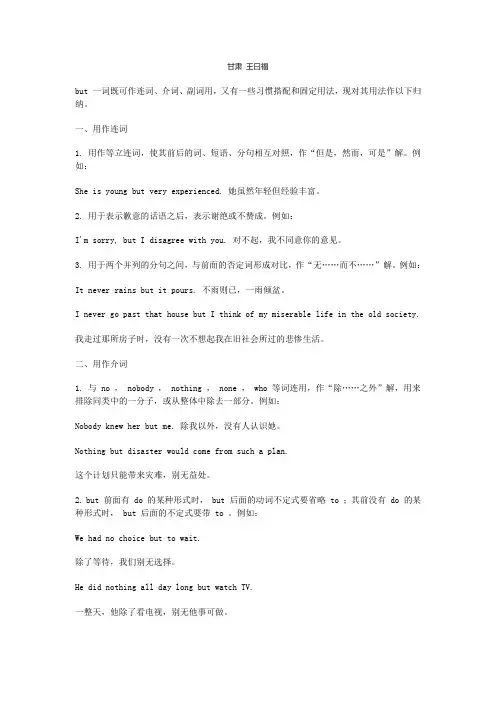
甘肃王曰福but 一词既可作连词、介词、副词用,又有一些习惯搭配和固定用法,现对其用法作以下归纳。
一、用作连词1. 用作等立连词,使其前后的词、短语、分句相互对照,作“但是,然而,可是”解。
例如:She is young but very experienced. 她虽然年轻但经验丰富。
2. 用于表示歉意的话语之后,表示谢绝或不赞成。
例如:I'm sorry, but I disagree with you. 对不起,我不同意你的意见。
3. 用于两个并列的分句之间,与前面的否定词形成对比,作“无……而不……”解。
例如:It never rains but it pours. 不雨则已,一雨倾盆。
I never go past that house but I think of my miserable life in the old society.我走过那所房子时,没有一次不想起我在旧社会所过的悲惨生活。
二、用作介词1. 与 no , nobody , nothing , none , who 等词连用,作“除……之外”解,用来排除同类中的一分子,或从整体中除去一部分。
例如:Nobody knew her but me. 除我以外,没有人认识她。
Nothing but disaster would come from such a plan.这个计划只能带来灾难,别无益处。
2. but 前面有 do 的某种形式时, but 后面的动词不定式要省略 to ;其前没有 do 的某种形式时, but 后面的不定式要带 to 。
例如:We had no choice but to wait.除了等待,我们别无选择。
He did nothing all day long but watch TV.一整天,他除了看电视,别无他事可做。
3. 与 last , next 及 one , two 等连用,作“倒数第二、第三”等解。
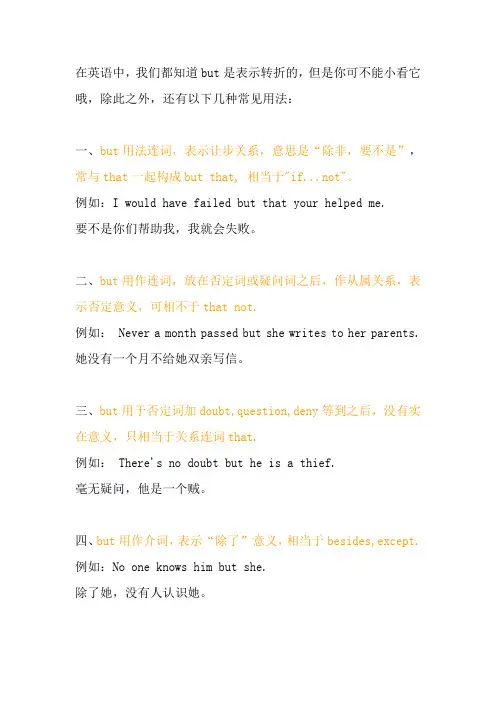
在英语中,我们都知道but是表示转折的,但是你可不能小看它哦,除此之外,还有以下几种常见用法:
一、but用法连词,表示让步关系,意思是“除非,要不是”,常与that一起构成but that, 相当于"if...not"。
例如:I would have failed but that your helped me.
要不是你们帮助我,我就会失败。
二、but用作连词,放在否定词或疑问词之后,作从属关系,表示否定意义,可相不于that not.
例如: Never a month passed but she writes to her parents. 她没有一个月不给她双亲写信。
三、but用于否定词加doubt,question,deny等到之后,没有实在意义,只相当于关系连词that.
例如: There's no doubt but he is a thief.
毫无疑问,他是一个贼。
四、but用作介词,表示“除了”意义,相当于besides,except. 例如:No one knows him but she.
除了她,没有人认识她。
五、but用作副词,相当于only, 常译为“只不过,仅仅”。
例如:He finished his homework but ten minutes ago.
他十分钟前刚完成作业。
六、but她用作代词,表示从属关系,在否定句中常相当于who/that not.例如:
There is no one but likes to help him.
没有人不认识他。
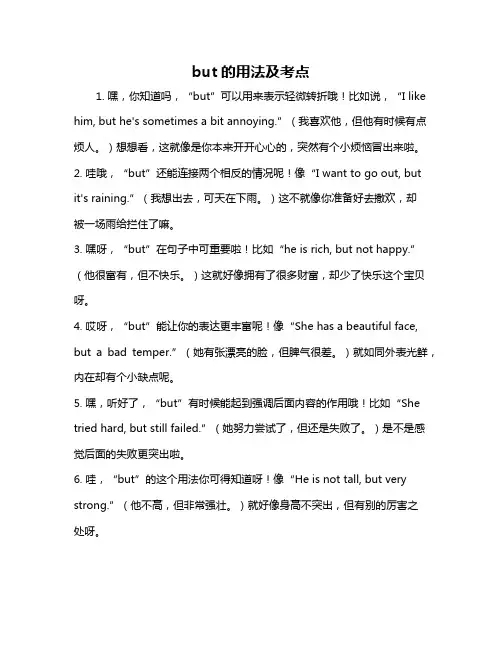
but的用法及考点1. 嘿,你知道吗,“but”可以用来表示轻微转折哦!比如说,“I like him, but he's sometimes a bit annoying.”(我喜欢他,但他有时候有点烦人。
)想想看,这就像是你本来开开心心的,突然有个小烦恼冒出来啦。
2. 哇哦,“but”还能连接两个相反的情况呢!像“I want to go out, butit's raining.”(我想出去,可天在下雨。
)这不就像你准备好去撒欢,却被一场雨给拦住了嘛。
3. 嘿呀,“but”在句子中可重要啦!比如“he is rich, but not happy.”(他很富有,但不快乐。
)这就好像拥有了很多财富,却少了快乐这个宝贝呀。
4. 哎呀,“but”能让你的表达更丰富呢!像“She has a beautiful face, but a bad temper.”(她有张漂亮的脸,但脾气很差。
)就如同外表光鲜,内在却有个小缺点呢。
5. 嘿,听好了,“but”有时候能起到强调后面内容的作用哦!比如“She tried hard, but still failed.”(她努力尝试了,但还是失败了。
)是不是感觉后面的失败更突出啦。
6. 哇,“but”的这个用法你可得知道呀!像“He is not tall, but very strong.”(他不高,但非常强壮。
)就好像身高不突出,但有别的厉害之处呀。
7. 哈哈,“but”真的超有用的!例如“She said she would come, but she didn't.”(她说她会来,但她没来。
)这不就是说了却没做到嘛。
总之,“but”的用法很多,学会了能让我们的英语表达更地道、更生动呀!。
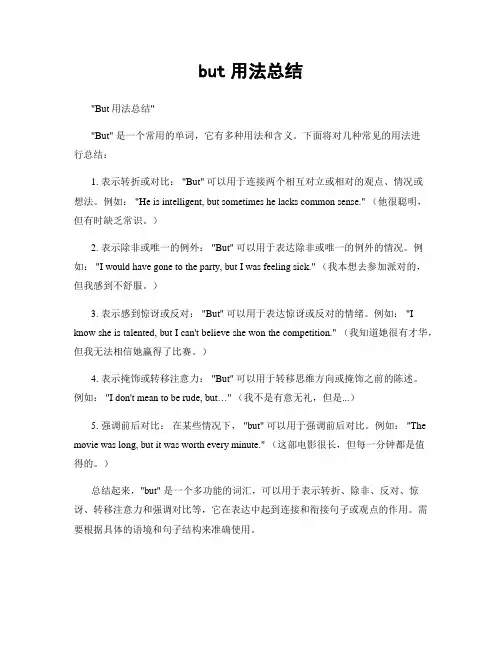
but用法总结"But用法总结""But" 是一个常用的单词,它有多种用法和含义。
下面将对几种常见的用法进行总结:1. 表示转折或对比: "But" 可以用于连接两个相互对立或相对的观点、情况或想法。
例如: "He is intelligent, but sometimes he lacks common sense." (他很聪明,但有时缺乏常识。
)2. 表示除非或唯一的例外: "But" 可以用于表达除非或唯一的例外的情况。
例如: "I would have gone to the party, but I was feeling sick." (我本想去参加派对的,但我感到不舒服。
)3. 表示感到惊讶或反对: "But" 可以用于表达惊讶或反对的情绪。
例如: "I know she is talented, but I can't believe she won the competition." (我知道她很有才华,但我无法相信她赢得了比赛。
)4. 表示掩饰或转移注意力: "But" 可以用于转移思维方向或掩饰之前的陈述。
例如: "I don't mean to be rude, but…" (我不是有意无礼,但是...)5. 强调前后对比:在某些情况下, "but" 可以用于强调前后对比。
例如: "The movie was long, but it was worth every minute." (这部电影很长,但每一分钟都是值得的。
)总结起来,"but" 是一个多功能的词汇,可以用于表示转折、除非、反对、惊讶、转移注意力和强调对比等,它在表达中起到连接和衔接句子或观点的作用。
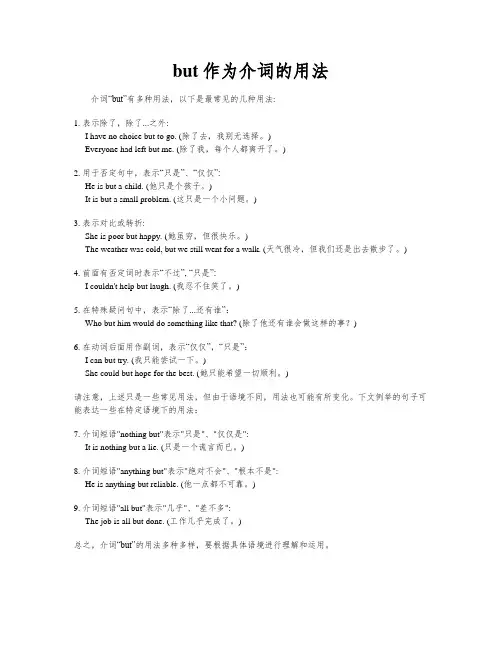
but作为介词的用法介词“but”有多种用法,以下是最常见的几种用法:1. 表示除了,除了...之外:- I have no choice but to go. (除了去,我别无选择。
)- Everyone had left but me. (除了我,每个人都离开了。
)2. 用于否定句中,表示“只是”、“仅仅”:- He is but a child. (他只是个孩子。
)- It is but a small problem. (这只是一个小问题。
)3. 表示对比或转折:- She is poor but happy. (她虽穷,但很快乐。
)- The weather was cold, but we still went for a walk. (天气很冷,但我们还是出去散步了。
)4. 前面有否定词时表示“不过”, “只是”:- I couldn't help but laugh. (我忍不住笑了。
)5. 在特殊疑问句中,表示“除了...还有谁”:- Who but him would do something like that? (除了他还有谁会做这样的事?)6. 在动词后面用作副词,表示“仅仅”,“只是”:- I can but try. (我只能尝试一下。
)- She could but hope for the best. (她只能希望一切顺利。
)请注意,上述只是一些常见用法,但由于语境不同,用法也可能有所变化。
下文例举的句子可能表达一些在特定语境下的用法:7. 介词短语"nothing but"表示"只是"、"仅仅是":- It is nothing but a lie. (只是一个谎言而已。
)8. 介词短语"anything but"表示"绝对不会"、"根本不是":- He is anything but reliable. (他一点都不可靠。
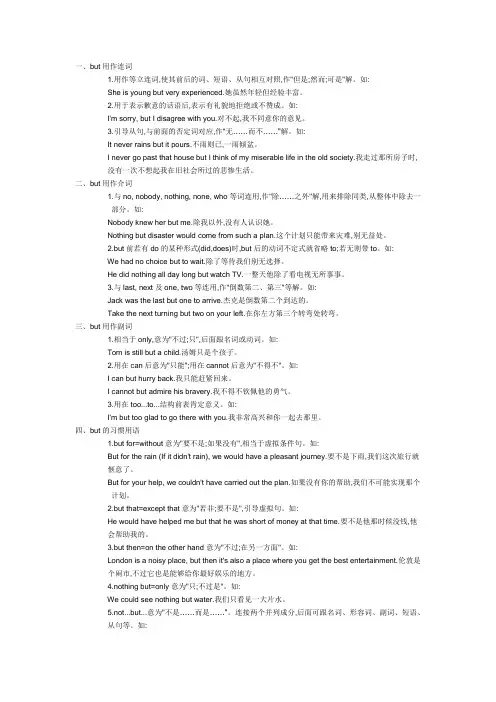
一、but用作连词1.用作等立连词,使其前后的词、短语、从句相互对照,作"但是;然而;可是"解。
如:She is young but very experienced.她虽然年轻但经验丰富。
2.用于表示歉意的话语后,表示有礼貌地拒绝或不赞成。
如:I'm sorry, but I disagree with you.对不起,我不同意你的意见。
3.引导从句,与前面的否定词对应,作"无……而不……"解。
如:It never rains but it pours.不雨则已,一雨倾盆。
I never go past that house but I think of my miserable life in the old society.我走过那所房子时,没有一次不想起我在旧社会所过的悲惨生活。
二、but用作介词1.与no, nobody, nothing, none, who等词连用,作"除……之外"解,用来排除同类,从整体中除去一部分。
如:Nobody knew her but me.除我以外,没有人认识她。
Nothing but disaster would come from such a plan.这个计划只能带来灾难,别无益处。
2.but前若有do的某种形式(did,does)时,but后的动词不定式就省略to;若无则带to。
如:We had no choice but to wait.除了等待我们别无选择。
He did nothing all day long but watch TV.一整天他除了看电视无所事事。
3.与last, next及one, two等连用,作"倒数第二、第三"等解。
如:Jack was the last but one to arrive.杰克是倒数第二个到达的。
Take the next turning but two on your left.在你左方第三个转弯处转弯。
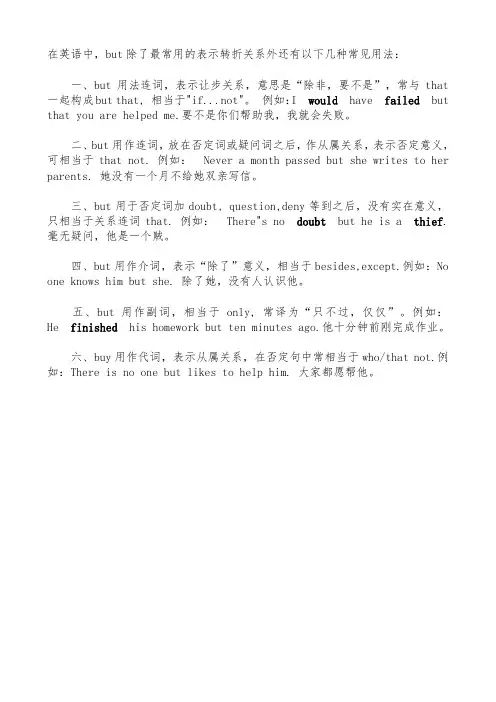
在英语中,but除了最常用的表示转折关系外还有以下几种常见用法:
一、but用法连词,表示让步关系,意思是“除非,要不是”,常与that 一起构成but that, 相当于"if...not"。
例如:I would have failed but that you are helped me.要不是你们帮助我,我就会失败。
二、but用作连词,放在否定词或疑问词之后,作从属关系,表示否定意义,可相当于that not. 例如:Never a month passed but she writes to her parents. 她没有一个月不给她双亲写信。
三、but用于否定词加doubt, question,deny等到之后,没有实在意义,只相当于关系连词that. 例如:There"s no doubt but he is a thief.毫无疑问,他是一个贼。
四、but用作介词,表示“除了”意义,相当于besides,except.例如:No one knows him but she. 除了她,没有人认识他。
五、but用作副词,相当于only, 常译为“只不过,仅仅”。
例如:He finished his homework but ten minutes ago.他十分钟前刚完成作业。
六、buy用作代词,表示从属关系,在否定句中常相当于who/that not.例如:There is no one but likes to help him. 大家都愿帮他。
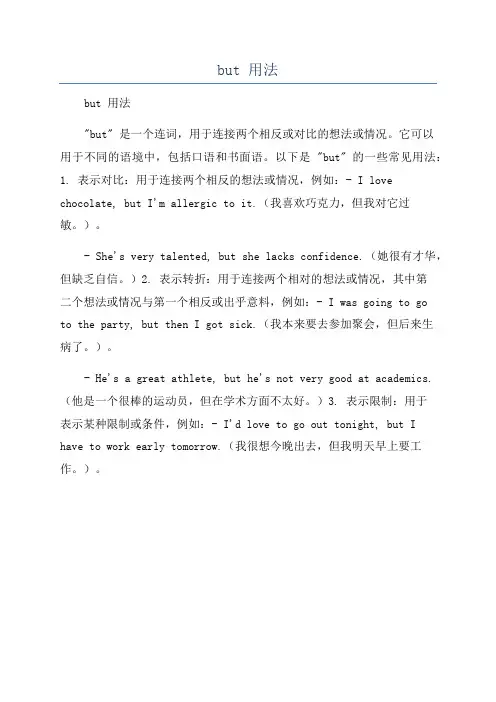
but 用法
but 用法
"but" 是一个连词,用于连接两个相反或对比的想法或情况。
它可以
用于不同的语境中,包括口语和书面语。
以下是 "but" 的一些常见用法:1. 表示对比:用于连接两个相反的想法或情况,例如:- I love chocolate, but I'm allergic to it.(我喜欢巧克力,但我对它过敏。
)。
- She's very talented, but she lacks confidence.(她很有才华,但缺乏自信。
)2. 表示转折:用于连接两个相对的想法或情况,其中第
二个想法或情况与第一个相反或出乎意料,例如:- I was going to go
to the party, but then I got sick.(我本来要去参加聚会,但后来生
病了。
)。
- He's a great athlete, but he's not very good at academics.(他是一个很棒的运动员,但在学术方面不太好。
)3. 表示限制:用于
表示某种限制或条件,例如:- I'd love to go out tonight, but I have to work early tomorrow.(我很想今晚出去,但我明天早上要工作。
)。
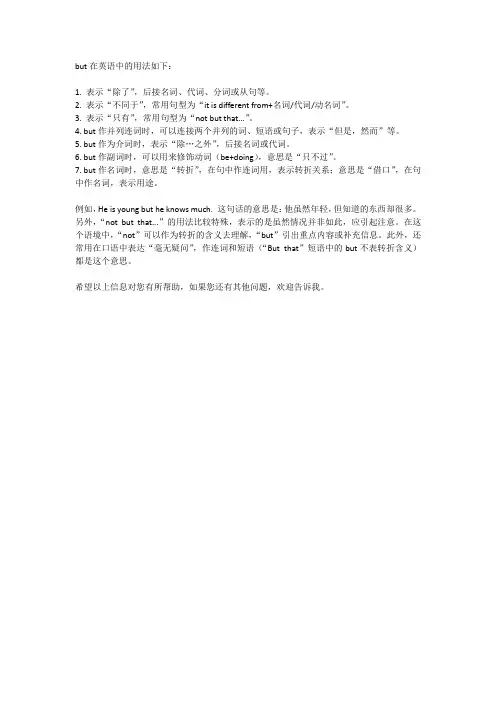
but在英语中的用法如下:
1. 表示“除了”,后接名词、代词、分词或从句等。
2. 表示“不同于”,常用句型为“it is different from+名词/代词/动名词”。
3. 表示“只有”,常用句型为“not but that...”。
4. but作并列连词时,可以连接两个并列的词、短语或句子,表示“但是,然而”等。
5. but作为介词时,表示“除…之外”,后接名词或代词。
6. but作副词时,可以用来修饰动词(be+doing),意思是“只不过”。
7. but作名词时,意思是“转折”,在句中作连词用,表示转折关系;意思是“借口”,在句中作名词,表示用途。
例如,He is young but he knows much. 这句话的意思是:他虽然年轻,但知道的东西却很多。
另外,“not but that...”的用法比较特殊,表示的是虽然情况并非如此,应引起注意。
在这个语境中,“not”可以作为转折的含义去理解,“but”引出重点内容或补充信息。
此外,还常用在口语中表达“毫无疑问”,作连词和短语(“But that”短语中的but不表转折含义)都是这个意思。
希望以上信息对您有所帮助,如果您还有其他问题,欢迎告诉我。
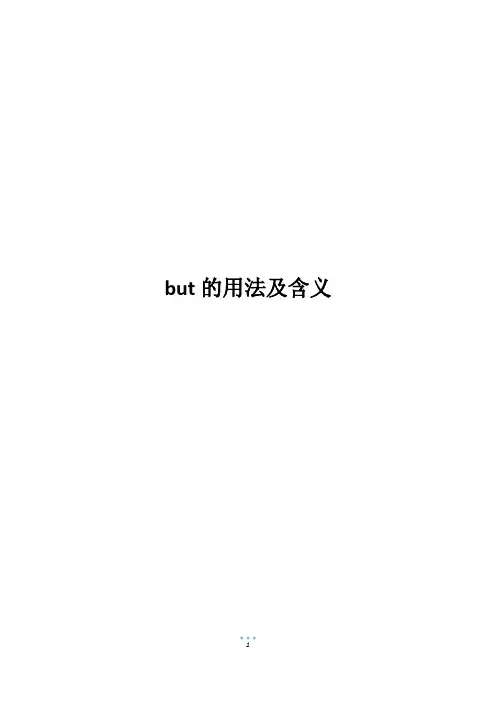
but的用法及含义but可以用作连词,基本意思相当于in spite of this或表示与所预料的不一样,意为“但是,然而,尽管如此”,不与though,although连用。
but还可以用作介词,表示“除……以外”,通常与表示确切意思的词。
but用作介词一般不置于句首。
一、but中文释义conj:而; 相反; 然而; 尽管如此; 表示歉意时说;prep:除了; 除……之外;adv:只有; 仅仅。
二、but用法1.用作连词but的基本意思相当于in spite of this或表示与所预料的不一样,意为“但是,然而,尽管如此”,不与though,although连用。
but可用来表达诸如愤怒、吃惊等强烈的感情,用来加强语气,也可用在表示歉意的句子里,常不译出,还可用于改变话题,意为“无论如何”“反正”“好”。
如果but接动词不定式,当前面有do或cannot时,不定式不带to; 当前面有anything, everything, nothing等词时,不定式常不带to,但也有例外; 其余情况带to。
2.用作介词but用作介词时表示“除……以外”,通常与表示确切意思的词,如no,all,any,every,each,none,nobody,anywhere等以及疑问词,如who,where,what等连用,但不能与some,many,several等表示不确切意思的词连用。
所以,我们可以说all but one,但不能说some but one或many but one。
也可与最高级形容词连用。
其后面可以是名词、介词短语、形容词等。
but用作介词一般不置于句首。
but引导的短语后置于主语之后时,句中谓语应该和主语在人称和数上保持一致。
三、but双语例句1.Your work is all right but I'm sure you could do better.你的工作还算可以,但我相信你可以干得更好。
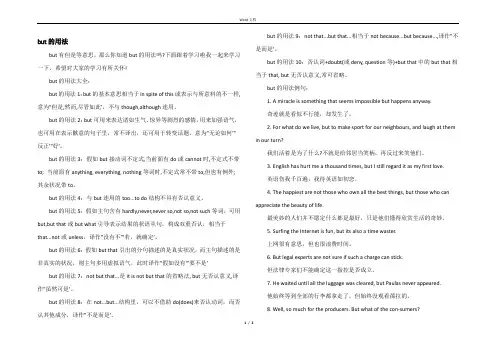
but的用法but有但是等意思,那么你知道but的用法吗?下面跟着学习啦我一起来学习一下,希望对大家的学习有所关怀!but的用法大全:but的用法1:but的基本意思相当于in spite of this或表示与所意料的不一样,意为"但是,然而,尽管如此',不与though,although连用。
but的用法2:but可用来表达诸如生气、惊异等剧烈的感情,用来加强语气,也可用在表示歉意的句子里,常不译出,还可用于转变话题,意为"无论如何'"反正'"好'。
but的用法3:假如but接动词不定式,当前面有do或cannot时,不定式不带to; 当前面有anything, everything, nothing等词时,不定式常不带to,但也有例外; 其余状况带to。
but的用法4:与but连用的too...to do结构不具有否认意义。
but的用法5:假如主句含有hardly,never,never so,not so,not such等词,可用but,but that或but what引导表示结果的状语从句,构成双重否认,相当于that...not或unless,译作"没有不'"若,就确定'。
but的用法6:假如but that引出的分句描述的是真实状况,而主句描述的是非真实的状况,则主句多用虚拟语气,此时译作"假如没有'"要不是' but的用法7:not but that...是it is not but that的省略法, but无否认意义,译作"虽然可是'。
but的用法8:在not...but...结构里,可以不借助do(does)来否认动词,而否认其他成分,译作"不是而是'。
but的用法9:not that...but that...相当于not because...but because...,译作"不是而是'。
but的用法和词汇"但"是一个连词,常用于引入一个相对于前面所说的内容相对立的内容。
它可以用来对比、转折或表示相反的观点、情况或行为。
以下是一些常见的用法和相关词汇:1. 转折用法:- 他虽然努力了,但没有取得好成绩。
(although)- 她很聪明,但有时候很懒散。
(but sometimes)- 我们计划去旅行,但天气不好。
(but the weather)2. 对比用法:- 我喜欢音乐,但我不喜欢跳舞。
(but I don't like dancing)- 这件衣服很漂亮,但太贵了。
(but it's too expensive)- 她长得很美,但性格却很内向。
(but she's introverted)3. 表示相反观点或情况:- 我们应该保护环境,但很多人并没有意识到这一点。
(but many people are not aware of this)- 这本书很有趣,但结局太草率了。
(but the ending is rushed) - 他决定辞职,但我认为这是一个错误的决定。
(but I think it's a wrong decision)相关词汇:- 但是 (dànshì):but, however- 不过 (búguò):but, however- 然而 (rán'ér):however, nevertheless- 可是(kěshì):but, yet- 尽管(jǐnguǎn):although, even though。
but 的用法"but" 是一个连词,用于表示对比或者转折的关系。
它在句子中的用法主要有以下几种:1. 表示转折:用于连接两个相对立或者出乎意料的句子成分,表示情况发生了变化或者出现了矛盾。
例如:"I thought it would rain, but it didn't."(我以为会下雨,但是并没有。
)2. 用于否定句:在否定句中,"but" 用于表示对前面所述情况的限制或者修正。
例如:"I don't like coffee, but I enjoy a cup of tea."(我不喜欢咖啡,但是我喜欢一杯茶。
)3. 用于提出反对意见:在对话中,当某人提出一个观点时,使用"but" 来提出不同的看法。
例如:"She said she would come, but she didn't."(她说她会来,但是她没有来。
)4. 用于强调:有时"but" 用于强调后面的句子,特别是当后面句子的内容与前文相反或者有重大区别时。
例如:"He is a teacher, but he knows a lot about music."(他是一名教师,但是他对音乐的了解很多。
)5. 用于表达限制或条件:在某些句子中,"but" 表示某种限制或者条件,表明虽然某种情况通常成立,但是在特定情况下不适用。
例如:"You can borrow my book, but you must return it next week."(你可以借我的书,但是你必须下周还给我。
)"but" 的用法非常灵活,它能够用于各种不同的语境和句子结构中,以表达对比或转折的关系。
but介词的用法but是一个常用的介词,它有多种用法和含义。
在不同的语境中,but可以表示除了、除非、但是、仅仅等意思。
下面将详细介绍but介词的用法。
首先,but可以表示除了。
例如,我们可以说:“除了学习,他没有其他爱好。
”这句话中的but表示除了学习之外,他没有其他爱好。
又如:“除了这个问题,其他都很顺利。
”这句话中的but表示除了这个问题之外,其他都很顺利。
其次,but可以表示除非。
例如,我们可以说:“我不会去那个地方,除非有人陪我。
”这句话中的but表示除非有人陪我,否则我不会去那个地方。
又如:“除非你同意,否则我们不会进行这项计划。
”这句话中的but表示除非你同意,否则我们不会进行这项计划。
此外,but还可以表示但是。
例如,我们可以说:“我很喜欢这个电影,但是结局让我感到失望。
”这句话中的but表示我很喜欢这个电影,但是结局让我感到失望。
又如:“他很聪明,但是缺乏实践经验。
”这句话中的but表示他很聪明,但是缺乏实践经验。
最后,but还可以表示仅仅。
例如,我们可以说:“这个问题不是简单的,但是需要深入研究。
”这句话中的but表示这个问题不是简单的,而是需要深入研究。
又如:“这个地方不大,但是很美。
”这句话中的but表示这个地方不大,但是很美。
总之,but是一个多功能的介词,它可以表示除了、除非、但是、仅仅等意思。
在使用but时,我们需要根据具体的语境来确定其含义。
同时,我们还需要注意but的位置和搭配,以确保句子的语法正确和表达的准确性。
通过正确使用but介词,我们可以更加准确地表达自己的意思,使语言更加丰富多样。
but 的用法but 一词既可作连词、介词、副词用,又有一些习惯搭配和固定用法,现对其用法作以下归纳。
一、用作连词1. 用作等立连词,使其前后的词、短语、分句相互对照,作“但是,然而,可是”解。
例如:She is young but very experienced. 她虽然年轻但经验丰富。
2. 用于表示歉意的话语之后,表示谢绝或不赞成。
例如:I'm sorry, but I disagree with you. 对不起,我不同意你的意见。
3. 用于两个并列的分句之间,与前面的否定词形成对比,作“无……而不……”解。
例如:It never rains but it pours. 不雨则已,一雨倾盆。
I never go past that house but I think of my miserable life in the old society.我走过那所房子时,没有一次不想起我在旧社会所过的悲惨生活。
二、用作介词1. 与 no , nobody , nothing , none , who 等词连用,作“除……之外”解,用来排除同类中的一分子,或从整体中除去一部分。
例如:Nobody knew her but me. 除我以外,没有人认识她。
Nothing but disaster would come from such a plan.这个计划只能带来灾难,别无益处。
2. but 前面有 do 的某种形式时, but 后面的动词不定式要省略 to ;其前没有 do 的某种形式时, but 后面的不定式要带 to 。
例如:We had no choice but to wait.除了等待,我们别无选择。
He did nothing all day long but watch TV.一整天,他除了看电视,别无他事可做。
3. 与 last , next 及 one , two 等连用,作“倒数第二、第三”等解。
but 用法1.but 当名词用but 当成名词的时候,中文意思是指「但是」的意思。
but当成名词用非常少见,但这个用法还是有喔。
例:There’ll be no buts about it. 没有商量的余地。
2. not only…but also…不只…而且….「not only…but also…」的句型用法在英文里面非常常见,一定要学起来。
not only…but also…的意思是「不只…而且….」。
例:Helen is not only pretty but also hard-working. 海伦不只漂亮,而且工作很努力。
3.but 当作介系词but 本身也有「except」的意思,此时当作介系词使用,这个用法也满常见的。
例:He’s one of those guests who does nothing but plain. 他是那种只知道抱怨的客人。
4.but 当作连接词用but 是一个对等连接词,在but 的用法里面非常常见,一样要学起来。
例:The meal was good but expensive. 这顿饭好吃,但就是贵了点。
例:You may delay, but time will not. 你可能会延迟,但时间不会。
5.but not 但不是but not 是一个非常常见的片语喔,用来表示「但不是…」的意思。
例:I’d love to go for a pizza with you but not tonight. 我想跟你一起去吃披萨,但不是今晚。
6.but for+理由要不是But for 也是很常见的用法,but for 后面通常会加上理由,用来说明一些事情的原因,此时意思通常是「要不是」的意思。
例:But for the traffic, I would have been here an hour ago. 要不是因为交通,我早就抵达这里一小时了。
BUT的所有⽤法 BUT的意思是但是; ⽽是; 除了; 只因为;BUT的所有⽤法有哪些呢?本⽂是店铺整理BUT的所有⽤法的资料,仅供参考。
BUT的所有⽤法 ⼀、⽤作连词 1. ⽤作等⽴连词,使其前后的词、短语、分句相互对照,作“但是,然⽽,可是”解。
例如: She is young but very experienced. 她虽然年轻但经验丰富。
2. ⽤于表⽰歉意的话语之后,表⽰谢绝或不赞成。
例如: I'm sorry, but I disagree with you. 对不起,我不同意你的意见。
3. ⽤于两个并列的分句之间,与前⾯的否定词形成对⽐,作“⽆……⽽不……”解。
例如: It never rains but it pours. 不⾬则已,⼀⾬倾盆。
I never go past that house but I think of my miserable life in the old society. 我⾛过那所房⼦时, 没有⼀次不想起我在旧社会所过的悲惨⽣活。
⼆、⽤作介词 1. 与no ,nobody ,nothing ,none ,who 等词连⽤,作“除……之外”解,⽤来排除同类中的⼀分⼦,或从整体中除去⼀部分。
例如: Nobody knew her but me. 除我以外,没有⼈认识她。
Nothing but disaster would come from such a plan. 这个计划只能带来灾难,别⽆益处。
2. but 前⾯有do的某种形式时,but后⾯的动词不定式要省略to ;其前没有do的某种形式时,but后⾯的不定式要带to。
例如: We had no choice but to wait. 除了等待,我们别⽆选择。
He did nothing all day long but watch TV。
⼀整天,他除了看电视,别⽆他事可做。
在英语中,我们都知道but是表示转折的,但是你可不能小看它哦,除此之外,还有以下几种常见用法:一、but用法连词,表示让步关系,意思是“除非,要不是”,常与that一起构成but that, 相当于"if...not"。
例如:I would have failed but that your helped me.要不是你们帮助我,我就会失败。
二、but用作连词,放在否定词或疑问词之后,作从属关系,表示否定意义,可相不于that not.例如:Never a month passed but she writes to her parents.她没有一个有不给她双亲写信。
三、but用于否定词加doubt,question,deny等到之后,没有实在意义,只相当于关系连词that.例如:There's no doubt but he is a thief.毫无疑问,他是一个贼。
四、but用作介词,表示“除了”意义,相当于besides,except.例如:No one knows him but she.除了她,没有人认识她。
五、but用作副词,相当于only, 常译为“只不过,仅仅”。
例如:He finished his homework but ten minutes ago.他十分钟前刚完成作业。
六、buy用作代词,表示从属关系,在否定句中常相当于who/that not.例如:There is no one but likes to help him.没有人不认识他。
动词搭配1. add to增加,增进add … to把…加进…add up相加add up to总计,所有这一切说明1) I don't think these facts will ________ anything.2) Fifty new books have been ________ the library.3) The music _________ our enjoyment of the film.4) You must have made a mistake when you _______ the bill ________.( add up to, added to, add to, added…up )2. break away from打破,脱离,挣脱,改掉break down出毛病,身体(精神)衰弱,分解,拆开break off暂停,中断break in强行进入,插话break into闯入break into pieces成为碎片break out爆发break up捣碎,驱散,瓦解,学期结束,拆散break through突破1) The criminal managed to break _______ ______ the police and ran into the woods.2) When he heard the news, he broke _______ and cried.3) Don't break ________ while others are speaking.4) Why don't you break ________ for a few minutes and have some coffee?5) When does school break ________?6) After harvest we break _________ the soil with a tool pulled by two oxen. ( away from, down, in, off, up, up )3. bring up抚养,呕吐,提出bring about造成bring out拿出,出版bring in引入,引进,挣钱bring back使回想起bring down使下降,使倒下1) The shopkeeper brought his price _________ to only five dollars.2) The school has brought _________ new foreign teachers to teach oral English.3) The song brought ___________ happy memories of our schooldays.4) Do you know what brought ___________ this misunderstanding?5) The kind old man agreed to bring __________ the young orphan.6) We decided to bring the matter ___ at the next meeting.7) The wind brought _______ a lot of trees last night.8) Next month they will bring ________ a new edition of the book.( down, in, back, about, up, up, down, out )4. call on号召,拜访(某人)call at拜访、参观(某地)call for去叫某人, 要求, 需要call up使回忆起, 征召入伍call in召集,请某人来call out大喊,高叫call off取消,不举行1) Doctors are often called _____ in the middle of the war.2) Please wait for me at home. I'll call _______ you at your house at seven tonight.3) The trains calls _______ several big cities between Beijing and Guangzhou.4) He called her name __________, but she didn't answer.5) The sports meet was called ____ on account of the rain.( in, for, at, out, off)5. come about发生,出现come down下跌,落,降,传下来come in进来come into (sight/being/existence/use/notice/effect)come on来临/ 快点come out出版,结果是come along一道来,赶快come to达到(an end/an agreement/a stop)苏醒,合计,总共是come over走过来come up发芽,走近come across偶然碰到come back回想起come from来自,源自1) I come _________ the book I lent you last month.2) How did it come _________ that you both got lost? I thought you had a map.3) It suddenly came _________ to me where I had seen the boy before.4) Come __________ now, or else we shall be late.5) He came __________ me like a tiger.6) The price of petrol has come _________ since the beginning of this year.7) The word came __________ use many years ago.8) When the examination result came _________, he had already got a job.9)The bill came __________ over a thousand dollars.10) I sowed the seeds over a month ago, but they haven't come __________ yet. ( for, about, back, on, at, down, into, out, to, up )6. cut across抄近路cut down砍倒,削减cut off切断,割掉,断绝关系cut up连根拔除,切碎through剪断,凿穿cut out删(省)掉,戒掉cut in插嘴1) Don't cut ___ this tree. It will be very shady in summer.2) You must cut ________ the number of cigarettes you smoke, or it will cause illness.3) We decided to cut _________ the moor(旷野)to the village.4) Cutting the tree ____ means cutting the tree into pieces.5) The electricity was cut ___________ when the lady refused to pay the bill.6) We were having a pleasant conversation when T om cut __________.(down, down, across, up, off, in )7. die of (disease/hunger/grief/old age)死于(疾病,饥饿,寒冷,情感原因)die from死于(意外事故、情形)die away渐渐消逝die out绝种die down(炉火)渐熄die off逐一死去8. fall behind落后fall over one's feet 跌跤fall down掉下,跌倒fall back撤退,后退1) Babies often fall _____ when they are learning to walk.2) Our team seems to have fallen __________ the others.3) As soon as the enemies fell __________, the people returned to their village.4) She fell__________ the bench and had her leg broken.(down, behind, back, over )9. go in for从事,喜爱,参加go through通过,经受go over复习,检查go up(价格)上涨,建造起来go after追捕,追赶go against违反go ahead先行,开始吧,问吧,说吧go away离开go by时间过去go down下沉,降低,(日、月)西沉go on(with)继续进行go with相配,陪同go without没有,缺少go out外出,熄灭go all out全力以赴go off爆炸,进行,变坏,断电,停止供应go back on背约,食言go beyond超出1) Many new factories have gone __ in the past few years.2) Rents have gone __________ greatly recently.3) Many years have gone ___________ since we first met.4) Let's continue our journey until the sun goes _______.5) His actions went ___________ the will of the people,6) I can't do it, for it goes ___________ my duty.7) Over 100 students went ____________ this entrance examination.8) The bomb went ____________ and killed ten people.9) The buyer went ___________ the car carefully before reaching a decision.10) This tie doesn't go ___________ my blue shirt.11) If you think you can solve the problem, go ______.12) Many students went __________ playing basketball.(up, up, by, down, against, beyond, through, off, over, with, ahead, in for ) 10. get down下来,记下,使沮丧get down to致力于,专心于get on进展,进步,穿上,上车get off脱下,下车get in收集,插(话)get away逃跑,逃脱,去休假get over忘记,越过,克服,从疾病中恢复get along with进展,相处get up起床get through打通电话,完成,通过get round消息传开get close to sth. 接近,几乎get into (trouble)get to (know)get back取回,收回get out1) She spoke so fast that I couldn't get ____ what he said.2) We will find ways to get _________ difficulties.3) The story has got __________, and everyone knows about it.4) When I get _________ with the report, I'll go to the cinema.5) After a delicious meal the two men got __________ to business.6) Don't always get __________ a word when others are speaking.7) It took me a long time to get ___________ such an unpleasant experience. (down, over, round, through, down, in, over)11. give away赠送,泄露,出卖give out发出,疲劳,分发,公布give off发出(光、热、气体)give in (to sb.) 屈服give up放弃,让(座位)1) His accent at last gave him __________.2) The liquid gave ________ a strong smell.3) The headmaster gave ___________ the names of the prize-winners.4) The soldiers gave _________ the town to the enemies.5) Who will help me to give the books ___________?6) Don't believe in those who give his friends ________.7) After a long walk, my strength gave ____________.(away, off, out, up, out, away, out)12. hand in交上,提交hand out分发hand down流传,遗传13. hang about闲逛hang up挂电话14. hold back阻止,隐瞒hold up举起,使停顿hold on别挂电话,等,坚持hold out持续,坚持,伸出hold down控制,镇压1) I'm sure he is holding something _________.2) She managed to hold ______ her emotion until her guests had left. Then she cried.3) Tell him to hold ________ a moment. I'll come soon.4) Our food supply won't hold _________ for more than a few days.5) The train was held ________ as a result of the floods.6) These measures helped to hold ___________ the city's population.7) Hold ___________ your left arm, please.(back, back, on, out, up, down, up)15. keep up (courage, English, spirits)保持,keep up with跟上keep off (grass)不接近,离开keep away from避开,不接近,离…远远的keep out ofkeep to (rules, promise)坚持,遵守keep on继续,坚持下来keep back阻止,留下,隐瞒,扣下keep from克制,阻止1) The angry lady told the strangers to keep ________ from her.2) I can hardly keep ________ my tears after hearing his words.3) Only pride kept her __________ bursting into tears.4) I can scarcely keep __________ asking him what he has done.5) "Don't touch me," screamed the woman, "Keep __________!"6) Keep _________ until you succeed.7) Keep _________ your courage, and you'll succeed in the end.8) The thick coat can keep the cold ___________.9) Always try to keep ___________ the rules when you play a game.10) I can't keep ________ with everything you're doing. (away, back, from, from, off, on, up, out, to, up)16. knock at/on敲knock into撞到某人身上knock down撞倒knock out of把…敲出knock over撞倒knock off停止工作,休息1) The boxer soon knocked his opponent _________.2) The office stuff knocks _________ at six every day.3) Try knocking __________ the window and see if there is anyone indoors.4) He was so absorbed in his book that he knocked __________ the car parked there. (down, off, on, into)17. leave for离开前往leave out删去,遗漏leave behind遗留,忘记拿走leave to留给,遗嘱赠于leave over遗留,剩下,延期1) "Whose name has been left __________?" demanded the teacher.2) When he died, he left all his property _____ his niece.3) He suddenly realized that he had left his umbrella ___________.4) Don't leave this matter _________ until tomorrow.5) Leave some meat ___________ for tomorrow.6) Those are questions left _________ by history.(out, to, behind, over, over, over)18. look up查找,向上看look through翻阅,浏览look on旁观look on…as看作look into调查look after/ at / for 照顾/看/寻找look out(for)当心look about / around/round四下查看look down upon瞧不起look back upon回忆,回顾look ab. up and down仔细打量某人look ab in the face/eyes直视某人1) I spent two hours looking ______ the students' papers.2)Look _______! There is a big hole in front.3) He took part in the game, and the rest of us just looked ______ and cheered for him.4) The old man looked _____ upon the days of his youth.5) She was so snobbish(势利)that she looked __________ upon all his neighbours.6) The police promised to look __________ the case as soon as possible.7) He looked __________ but saw nobody, and he listened but hear nothing. (through, out, on, back, down, into, about/around/round)19. make up编造,配制,打扮,组成make up for弥补make into / of / from 制成make out弄懂,发现,看出,填写,开列(清单)make for走向,驶往,促使1) Can you make this length of cloth __________ a suit?2) I asked the driver if he was making ___________ London?3) My father made __________ a check for me to buy the camera.4) We must make the loss _________ next week./ He tried hard to make ________ for the damage he had done.5) He made __________ a story, which I found hard to believe.6) Someone is coming, but I can't make ___________ who it is.(into, for, out, up/up, up, out)20. pass away去世pass by经过pass down(on)…to传给pass through经历pass over漠视,忽视1) The old clock has been passed ________ to me from my grandfather's grandfather.2) The man passed ___________ last week in peace.3) We are passing ____________ difficult times.4) The secretary passed ___________ the details in the first part of his report. (down, away, through, over)21. pay back还钱,报复pay for付钱,为…受到惩罚,因…得到报应pay off还清1) How much did you pay __________ the dictionary?2) You should pay _________ the money you borrowed from me.3) I'll pay him ____________ for all his crimes(罪行) against me.4) Some day, you'll pay __________ what you have done today.5) Has she pay ____________ the debt yet?(for, back, back, for, off)22. pick up拾起,获得(information),接人,站起,收听,自然习得(language /knowledge),恢复重获(pick up health)pick out挑选,辨认,看出1) I picked the information __________ while waiting in the queue.2) My friend has arranged to pick me _________ at 6:00.3) The patient has picked _________ health during the last two weeks.4) She picked _______ the most expensive pair of shoes.5) I can't pick John ___________ in the crowd.6) Can I pick __________ VOA with this short-wave radio?7) He fell down suddenly, but picked himself ___________ quickly.(up, up, up, out, out, up, up)pick cotton/flower/leaves/words选词23. put up搭起,张贴,举起,安装,投宿,安排住下put up with忍受put out伸出,扑灭put off推迟put into放进,翻译put away放好,存钱put down记下,平息put on穿戴,上映,增加(put on weight/speed)put forward 提出,提前put through 接通电话put aside放到一边put back放回1) He put _________ half his wage every week.2) The government soon put __________ the revolt(暴乱).3) Put your watch __________. It's slow.4) He put __________ his hand for me to shake.5). Please put me __________ to Extension(分机)2.6) We put ___________ for night at the village inn.7) He is very proud, and he often put _________ airs.(摆架子)8) We had a telephone put _____________ in our office.9) I can't put __________ with your laziness.(away, down, forward, out, through, up, on, up, up)24. pull down拆掉,推翻pull on匆匆穿上/ off 脱pull in进站pull out取出,(火车)离站pull down往下拉,拆毁pull over驶到一边pull through恢复健康,渡过难关,脱离险境pull up(使)停住1) The train slowly pulled __________ and disappeared in the distance.2) All the old houses here have now been pulled ______, and new ones are to be built.3) The car pulled _________ when I blew the horn.4) The doctor thinks the man will pull __________.5) The driver pulled ________ at the traffic lights.(out, down, over, through, up)25. push over推倒,刮倒push ahead(on, forward)继续前进,坚持下去push through排除困难办好谋事,努力设法通过,挤过1) We've decided to push __________ with our plan to build a new road2) Many trees were pushed __________ in the hurricane.3) They were determined to push the new rules ________ at any cost..4) Take care not to push the baby _________.5) They pushed ___________ the crowd and at last reached us.(on, over, through, over, through )26. run across偶然碰到run after追逐,追捕run away逃跑run for竞选run into偶然碰到(困难)遇见(人),相撞run out of用完1) If you drive so fast, you'll run _________ someone some day.2) I ran __________ a friend of mine in the exhibition.3) Our water has run __________. Can you fill up some more bottles?4) Why do you always run __________ adventure?5) He didn't want to run ___________ president that year.6) In that way you will only run __________ difficulties.( into, across/into, out, after, for, into)27. see off送行see through看透,识破see to照料,照管28. send for派人去请send off送行send out发出(光亮)等send up发射29. set up建立set off出发,触发,引起set out动身,着手(to do),陈述set about开始着手(doing)set to work(n.)开始做set back拨回,使推迟1) I shall set my watch ___________ by five minutes.2) We set __________ reading the text aloud immediately the bell rang.3) We set _________ at daybreak yesterday and we've been travelling ever since then.4) I set __________ to advise him not to drink.5) What were the reasons he set ___________ in his report?6) The president set __________ a special group of soldiers to guard him.7) The unpopular law set _________ a series of protests.(抗议)(back, about, off/out, out, out, up, off)30. take off脱掉,起飞take on呈现雇佣take away拿走take in吸收,领会take up从事,占用(时间空间)take down记录,取下take back收回take for误认为take along随身带take over接管take out1) I take _________ all I said about his dishonesty.2) He went to the shelf and took __________ a book of poems.3) At first I took him _________ a doctor.4) I can see that most of you have taken ________ everything that the teacher taught.5) Bill has now taken __________ his father's business.6) My job takes __________ most of my time.7) The boss took ____________ twenty people for his new company.(back, down, for, in, over, up, on)take charge of负责, take sth. for granted想当然, take hold of抓住, take pride in 以… ……为自豪, take the place of, 代替take turns to do轮流做, take office就职31. think of想起think of…as把…看作think out想出think up想出think about考虑think over仔细考虑think well of sb. 对某人看法好32. turn off / on打开turn over翻身,反复考虑,翻(书页),翻转turn out证明为,结果,制造成品turn to转向,求助turn down调低,拒绝turn against变得敌视,反对turn away打发走,驱逐,转过脸去turn back返回,转回去turn round转过身来turn up向上翻,露面,出现,音量调大turn in上缴turn upside down把倒置,弄得乱七八糟1) The child turned __________ its mother for comfort.2) Turn ___________ and let me see your face.3) However much he turned the problem ________ in mind, he could find no satisfactory solution.4) The English evening party turned _________ a great success.5) The sight of the accident was too much for her to bear, and she turned _______.6) The football stadium was full, and many people had to be turned __7) The army turned him ___________ on account of (因为) his poor health.8) She turned the whole house ___________ in her search for her missing purse.9) Where did your purse turn ____________? I found it in the snow.10) The villagers suddenly turned __________ the foreigners who lived nearby.11) The factory turns ____________ 2000 new cars last year.(to, round, over, out, away, away, down, upside down, up, against, out)。